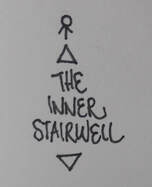Mediation Experience: I went in for my nightly meditation post drafting my prior post on how the "Enlightened" do not worship "mundane" deities. Under my meditation, I noticed my ego-identity didn't take kindly to the idea of leaving Krishna (Vishnu) and Shiva. In fact, I don't think I'll ever be able to fully in this ego-identity. As I am further mediating, attempting to switch from "I Am" body presence-awareness to "I" surrounding-presence awareness, to "Emptiness" non-awareness, running my channels, and moving my feeling sensation from body-feeling to attempting to feel the empty-space surrounding each of my atoms, I tried to end up thought-free but messages kept coming through. (My own or beyond, I don't know?). Nonetheless, I had to write thereafter. Brahma/Generator: Do not be fully satisfied with creation where you may mistake it as perfection and stop creating, that is why Brahma as creator is not worshiped. Brahma is your root and sacral chakra, which are associated with metaphorically grounding and creating within fertile soil. Transcending Brahma would be to recognize my own ability to manifest properly through my lower chakras. Such would be the law of attraction teachings, which I'm going to call "Nature-Realization" because it is recognizing the laws of nature (Vedas). (Other teachers call it "Law of Attraction" or "Self-Actualization). The Buddha said "thoughts create reality". So this would be the First Jewel of Buddhism, keeping the company of good thought. SANGHA. Mastery over Brahma. Vishnu (Krishna)/Operator: Vishnu is the "Higher Self" and "Krishna" is the avatar of that "Higher Self. Vishnu is properly managing what has been created by Brahma. Transcending Vishnu (Krishna) would be to love all creation. Vishnu is the solar plexus and the heart chakra. The solar plexus is our "free-will" to make choices, so such choices should be made from the heart, as in compassionate. Follow Krishna's playful example. The spoken word of Krishna in the Bhagavad-Gita describe most eloquently the Second Jewel of Buddhism in following one's own heart as "divine will". DHARMA. Mastery over Vishnu. Shiva/Destroyer: Shiva is the ability to transcend a situation. To transcend is to destroy a prior concept by simply moving beyond it. Shiva was the most difficult for me provided he is my favorite masculine archetype. Nonetheless, in meditation, I sensed ..."what do you think I represent, you're suppose to transcend me". The feeling was of a great congratulations and feeling of significant release. Under the tradition of Shiva (Saivite), yogis do not worship Shiva in form (Hari; Name given to Vishnu) but as the formless (Hara) symbolized as the Lingam. Moreover, recognizing Shiva as myself, as "awareness" seems to be the gist of yogic (unification) philosophy/experiential meditation. Another words, I am these archetypes and I need to be "aware" of that. I am Brahma (Generator), I am Vishnu (Operator), and I am Shiva (Destroyer). G-O-D. To accept that I am G-O-D, is a crazy pill to swallow and one my ego-identity needs to resolve. However, as the teachings of tantra describe, in identifying as "Awareness" you're identifying yourself as the "Higher Self". The "Higher Self" (Turya) according to the Siva Sutras is the master of being "aware" during three "witnessing" states of consciousness: 1) Waking; 2) Sleep; 3) Deep Sleep. In Advaita Vedanta, Shiva is "Awareness" and Shakti is "Witness". The dance between Awareness-Witness, God-Goddess, Yin-Yang, Masculine-Feminine, Divine Will-Divine Love, we seek to find a balance, harmony. This would be the Third Jewel of Buddhism. Like the Tao, words cannot truly describe, enlightenment. BUDDHA. Mastery over Shiva. As a "witness", mastery over "awareness". Realization of Self and Nature. Conclude:
For transcendence: I take refuge in the Three Jewels. SANGHA. DHARMA. and BUDDHA. (P.S. My definitions of the "Three Jewels" are different from main stream.)
0 Comments
Your comment will be posted after it is approved.
Leave a Reply. |
AuthorOverly educated and continuously exploring and revealing more behind the veil. "It cannot be too highly emphasized that the mystic swims in the same waters in which the psychotic drowns."
-James Wasserman, The Mystery Traditions Archives
August 2019
Categories
All
|

 RSS Feed
RSS Feed